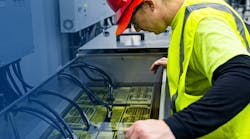Additional Data Center Applications for Lithium-Ion Batteries
In the third entry in a four-part Data Center Frontier Special Report Series that covers the future of lithium-ion batteries and their impact on energy storage, we explore the variety of ways lithium-ion batteries are being used in data centers.
Download the full report.
We’ve seen the advantages that lithium-ion batteries provide in traditional data centers. But there are a couple of additional practical applications that should be mentioned:
High-Rise Data Centers
The upper floors of multi-story facilities must sometimes be reinforced with steel beams to support the heavier weight of lead acid batteries. Since lithium batteries weigh less and require less space, they are more suitable for high-rise data centers. You can put lithium cabinets on higher levels without having to reinforce the floors, and the lighter li-ion batteries are easier to deploy in the data center’s upper levels.
Modular Data Centers
The smaller footprint of lithium-ion batteries makes them ideal for use in modular data centers, which are designed to fit large amounts of equipment into a smaller space. Since lithium batteries are also more lightweight, this cuts down on the total weight of a modular data center, making it easier and less expensive to transport it to its location of use.
Alternative Energy Solutions
Lithium-ion batteries are commonly used in battery energy storage systems (BESS) for renewable (e.g. solar, wind) and alternative (e.g. microgrids, peak-shaving) energy sources for data centers.
How the Batteries Work
Data center UPSs need batteries that can provide a large amount of power capacity for anywhere from a few seconds up to 10 minutes (or more) of ridethrough time, during the changeover to auxiliary power. To be effective in a data center, lithium-ion batteries must have chemistries and technologies that provide a large amount of energy in a short amount of time, while ensuring that the cells in the battery will maintain a safe internal temperature. Lithium-ion batteries use the same components of all battery systems. The positive electrode (cathode) is a lithium chemistry, while the negative electrode (anode) is a carbon substance, usually graphite. During discharge, an electric current produced by the lithium ions moves from the negative to the positive electrode (anode to cathode), conducted by an electrolyte made up of lithium salt in an organic solvent. During recharge, an external electric current moves the ions from the positive to the negative electrode (cathode to anode).
All chemical batteries are made up of electrochemical cells that hold the cathode and anode components. The cell is designed to be either an energy cell or a power cell. An energy cell is a “longer runtime source” that discharges a lower amount of power over a longer period of time. A power cell is a “shorter runtime source” that discharges a higher amount of power in a short period of time. Since a UPS’s function is to provide brief ride-through time during power changeover, power cells are better than energy cells for li-ion batteries in UPS applications.
The Different “Flavors” of Lithium
All lithium-based batteries are frequently referred to as “lithium-ion batteries.” But in fact, “lithium-ion” is a generic term. Different lithium-ion batteries use different lithium chemistries, and the different “flavors” of lithium have significant differences in performance and safety. It’s very important to pick the right lithium chemistry for the right application. The table below compares the different “flavors” of lithium-ion chemistries:
In the coming weeks, the special report series will also cover the following topics:
- Energy Storage: Lead Acid Versus Lithium-Ion Batteries
- Lithium-Ion Batteries Lead to Energy Storage TCO Savings
- Lithium Iron Phosphate – The Ideal Chemistry for UPS Batteries
Download the full report, “Why Lithium-Ion Batteries are the Future of UPS Energy Storage for Data Centers and Colocation Facilities,” courtesy of Liion, to lean more about the potential of lithium-ion batteries.


